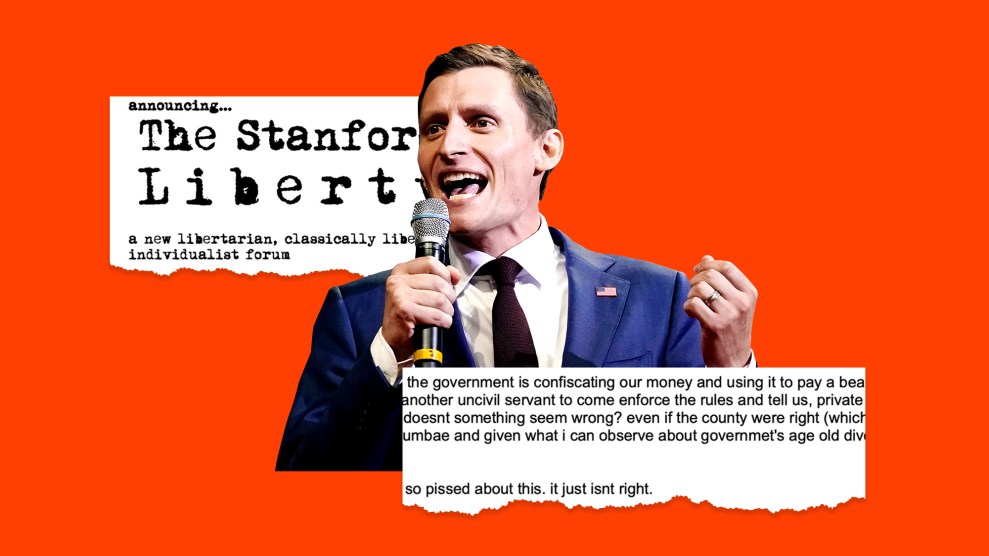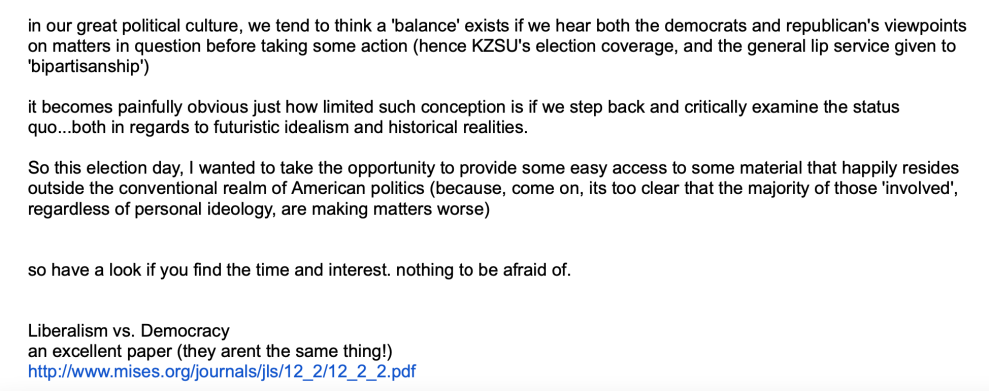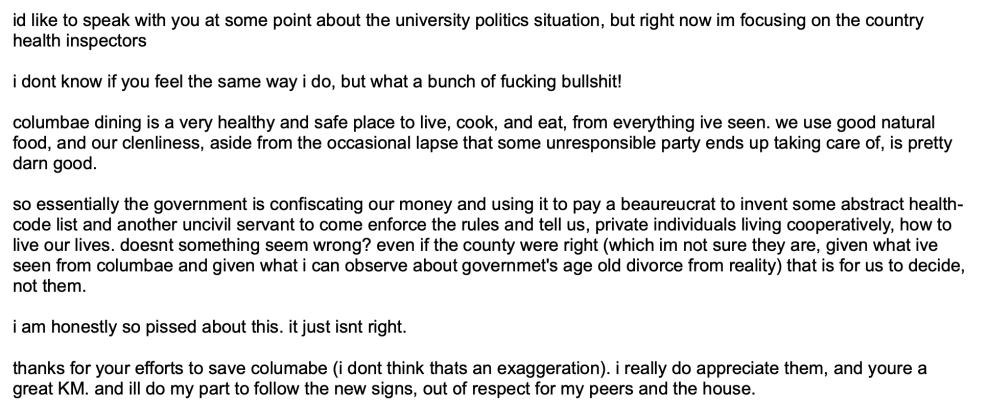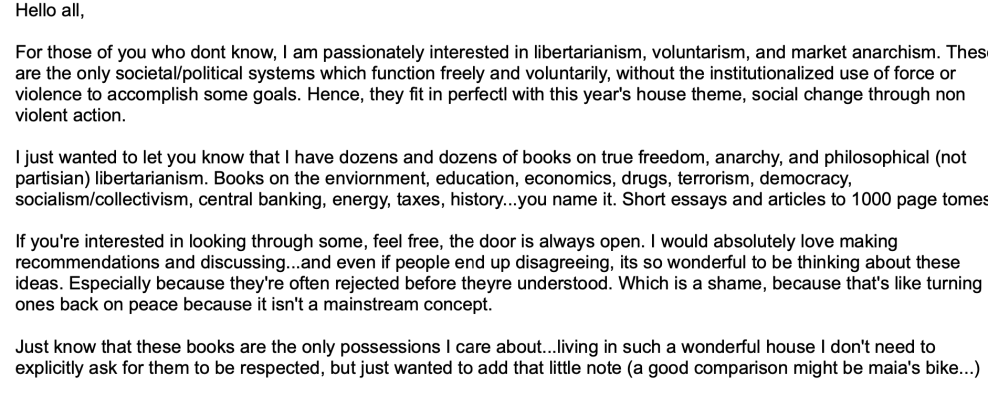
Mother Jones illustration; Ross D. Franklin/AP
On Election Day in 2005, then–Stanford sophomore Blake Masters sent two emails to the listserv of his vegetarian co-op. In the first, Masters, now the Republican Senate candidate in Arizona, urged classmates to read an article about a California ballot measure “[i]f you must worship that miserably peculiar American diety [sic] called Democracy.” In the second, he put together a reading list that could have easily served as a crash course in anti-democratic libertarianism.
Two of the articles were by Hans-Hermann Hoppe, a German economist best known for his 2001 jeremiad Democracy: The God That Failed. One, a 1995 paper titled “The Political Economy of Monarchy and Democracy, and the Idea of a Natural Order,” argued that “the historic transition from monarchy to democracy represents not progress but civilizational decline.” In addition to advocating “the abdication of democracy,” Hoppe wanted people to accept a “natural order” under which a “voluntarily acknowledged ‘natural’ elite—a nobilitas naturalis” reigns supreme.
The messages are among a group of 50 emails shared with Mother Jones that Masters sent to the co-op listserv between 2005 and 2007. They show Masters to be a sometimes charming, sometimes grating part of co-op life who would vow not to spam the listserv with political diatribes only to eventually succumb to the pressure to post. While many of the emails, which were also obtained by HuffPost, are mundane requests to swap chores or borrow hair clippers, others show a hostility to democracy that predates the anti-democratic behavior and rhetoric I documented in my July profile of Masters.
That profile was based on dozens of interviews, additional unpublished emails, leaked messages from a private chat server used by some of Masters’ top donors, and a close reading of many of the texts that have shaped the 36-year-old candidate’s worldview. It showed how Masters and his former boss, the billionaire investor Peter Thiel, transitioned from libertarians who hoped to escape politics to authoritarian sympathizers who seek to protect their liberty by gaining control of the state.
Since the story was published, Masters easily won the GOP primary in August thanks to roughly $15 million of support from Thiel and Donald Trump’s endorsement. He is now facing Sen. Mark Kelly, the former fighter pilot and astronaut who’s married to former congressperson Gabby Giffords. So far, polls show Kelly in the lead, with a massive cash advantage two months before the election. Majority Leader Mitch McConnell and National Republican Senatorial Committee leader Rick Scott have done little to hide their frustration after being saddled with an underperforming first-time candidate who has a penchant for needless provocation.
Masters also has shaken up his campaign in recent months. Amalia Halikias, the Yale-educated niece of Yale Law Professor and Battle Hymn of the Tiger Mother author Amy Chua, has gone from being campaign manager to an adviser. In her place atop the campaign is Daniel Bell, one of Masters’ friends from Stanford Law. Communications are now being handled by Katie Miller, a former Trump administration spokesperson married to former top Trump aide Stephen Miller. (Miller responded to an inquiry from Mother Jones, but did not comment on the substance of the emails.)
In his second Election Day 2005 email, Masters used the subject line, “Anyone up for Independent thinking?” He linked to six pieces whose material, he wrote, “happily resides outside the conventional realm of American politics.” One was by the left-wing anarchist Emma Goldman, who “knew a thing or two about democracy and the masses” in Masters’ view, despite being “wrong about property rights.” The rest were by libertarian reactionaries.
Masters described the first of the two Hoppe articles as an “interesting bit examining Monarchy, Democracy, and Natural Order.” He called the second a “much longer and more analytical” version of the same argument. It is not hard to imagine what Masters—an athletic, 6-foot-3 Stanford student—might have liked about Hoppe’s celebration of the “nobilitas naturalis.”
As Hoppe—a major influence on Curtis Yarvin, the self-proclaimed absolute monarchist blogger who recently made his first ever political contribution to his friend Masters’ campaign—explained in one of the articles Masters recommended: “because of selective mating and marriage and the laws of civil and genetic inheritance, positions of natural authority are more likely than not passed on within a few—noble—families.” The path forward was to provide “ideological support” to “all decentralizing or even secessionist social forces” so that the natural elite could reemerge in new jurisdictions.
In Democracy: The God That Failed, Hoppe was more explicit about those further down the social ladder, referring to them as “human trash which drives individual property values down.” In 2016, Thiel was set to speak at a conference in Turkey hosted by Hoppe’s Property and Freedom Society—a group whose past guests had included white nationalists like Richard Spencer and Jared Taylor—only to pull out after the news sparked a backlash.
Along with the Hoppe articles, Masters linked to an interview with Murray Rothbard, a Hoppe mentor whose idea of liberty allowed for defenses of Strom Thurmond, Joe McCarthy, and former Ku Klux Klan leader David Duke. He also shared pieces from Paul Gottfried, who has been called the “Alt-Right’s Jewish Godfather,” and Thomas DiLorenzo, a strident critic of Abraham Lincoln who has managed to get panned by both the Southern Poverty Law Center and the hard-right Claremont Review of Books. 
Masters offering up his Election Day red pills
Masters praised the Gottfried article for establishing that liberalism—with its emphasis on individual property rights—was not the same thing as democracy. He liked the interview with Rothbard because it showed that the United States government was “a warmaking machine since its inception!” The DiLorenzo article argued that not only was it patriotic not to vote, but that casting a ballot for nearly all American politicians was traitorous. (Voting for Ron Paul was the exception.)
Masters told co-op mates that he had “countless more articles, books,” as well as audio pieces, that could “offer an alternative and objectively more peaceful approach to social composition than voting, or even politics.” Anyone in Columbae, a left-wing co-op that ran on consensus, who wanted to learn more was welcome to “swing by anytime.”
There is ample evidence that this was not just a phase for Masters. In 2012, according to another email shared with me, Masters recommended Yarvin’s case for embracing monarchy to a former college roommate. Two years later, he co-authored a book with Thiel that explained how companies got things done by embracing structures that resembled “feudal monarchies.” The book was ostensibly about the business world, but it can easily be read as political theory.
Masters has said he came to see Trump as proof that the existing political order could actually be disrupted. He worked on Trump’s transition team and remained a loyal supporter after the former president’s efforts to steal the 2020 election. To the supporters who post memes about how Masters resembles Julius Caesar, the news that he was plugging Gottfried’s and Hoppe’s work as far back as 2005 will be yet another sign that he really is their guy.
At the same time, Masters appeared more able to engage others while at Stanford than he is today. For Martin Luther King Day in 2006, Masters wrote an article for a personal blog that was well received by a Black classmate, who called the post “concise and compelling.” Although the post is no longer available, another classmate wrote that Masters had expressed “the problem of over-racializing things.” More recently, Masters has favored trolling when it comes to discussing race.
— Blake Masters (@bgmasters) August 29, 2022
Masters’ targets were sometimes closer to home. In October 2005, after county health inspectors threatened to shut down the co-op’s kitchen if members failed another inspection, Masters fumed, “i dont know if you feel the same way i do, but what a bunch of fucking bullshit!”
“[S]orry so bitter,” Masters added later in the email, “but i get upset when the state passes some sort of recycling tax, mandatory education law, or drug prohibition…but when they physically come into my home and begin to tell me and my peers how to live, its enfuriating [sic].”
A less-outraged classmate responded by pointing out that they did not, in fact, live in a private home but rather in university-owned housing. Thus the presence of the health inspectors. Masters explained that he remained unconvinced before a third co-op member ended the debate: “I suggest we cut the public yipping and go clean the kitchen.”

Masters’ rage against the kitchen-inspecting machine
Some of Masters’ closest friends in the co-op initially saw him as a sweet and funny guy, but his obsession with politics proved tiring. After writing the Election Day emails, he eventually vowed to stop using the listserv to spread his gospel. But a couple of months later, Masters decided a new post he’d written was “important enough to warrant” breaking that rule. “The thesis is that the United States government is fascist,” Masters explained on a Saturday morning. “If only one person reads it, it will have been a well-spent friday night.” Just like the libertarian journal Masters launched while in college, The Stanford Liberty, the article itself is no longer available. (The journal’s website has been deliberately excluded—presumably by Masters or someone close to him—from the Internet Archive.)

Part of a flyer Masters sent around to announce his new journal
In February 2006, Masters sent an email to the listserv plugging a post on his Stanford blog that argued that roads should be privatized. The next day, he shared another that claimed the United States entered World War I to “to save banking interests and to fulfil [sic] Wilsons [sic] personal fantasy dream of a world government.” He quickly made the same argument in an article for the anti-state website LewRockwell.com. Channeling Rothbard, he wrote that the United States, hadn’t “been involved in a just war in over 140 years.” (After Jewish Insider found the article, Masters said that he had gone “too far” in making that claim.)
Masters also defended a classmate who was sympathetic to 9/11 conspiracy theories by saying there was nothing wrong with being a “conspiracy theorist” or a “revisionist historian.” He explained, “The story we’ve been told about 9/11 may indeed be correct, but blindly accepting it would be an error (as would accepting ‘conspiracy theories’ without reasonable possibilities/evidence presented).”
Other emails show Masters trying to resolve minor crises. In March 2006, someone at the co-op signed for a FedEx delivery intended for Masters that included more than $500 worth of books. “I can’t afford to replace the books,” Masters wrote while asking for help finding the package. “Plus, they are worth much more to me than 500 dollars.” As Masters had told his classmates at the start of the school year, his books were “the only possessions I care about.” Soon after the FedEx mishap, Masters was writing that “one of my new propaganda posters is missing.” To make matters worse, it was his favorite one—a recruitment poster for a US artillery corps.

An excerpt of email Masters wrote in September 2005
More than a decade later, the student of propaganda had left the classroom. He launched his campaign by calling for an America where families could get by on one income, only to provide no coherent plan for making that happen. He claimed Trump won the election, but added qualifiers to suggest to his more reality-based followers that he didn’t believe voting machines had actually been rigged. He called abortion “demonic” and a “genocide” then revamped his website’s abortion section after making it out of the primary.
Today, Masters is trailing Kelly in the polls, McConnell’s super-PAC is pulling ad spending, and Thiel is saying funding Masters’ campaign isn’t his responsibility. Theory is proving harder than practice.








